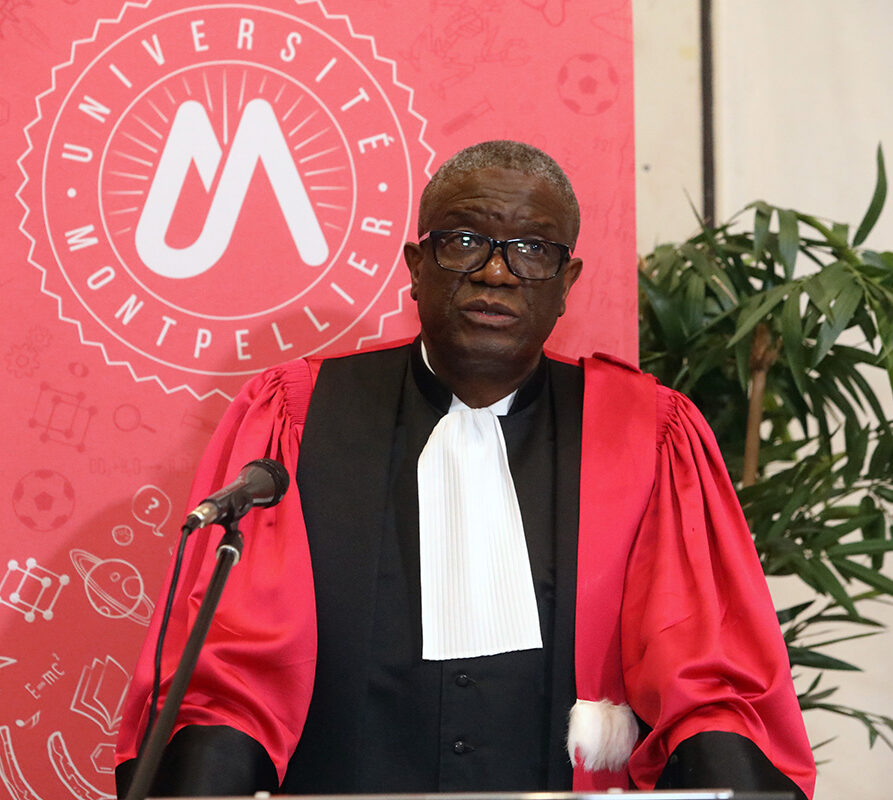Denis Mukwege, honorary doctorate
Winner of the 2018 Nobel Peace Prize for his fight against mass rape and sexual violence against women in his country, the Democratic Republic of Congo, the man many call "the man who repairs women" has once again called for changes to international criminal law and for gender equality.

On October 9, during the Africa-France Summit, the University of Montpellier paid tribute to Congolese doctor Denis Mukwege by awarding him an honorary doctorate during a ceremony held in the anatomy amphitheater of the historic Faculty of Medicine building.
"Above all, I wanted to raise awareness and draw your attention to the profound suffering of my compatriots [...] The daily lives of the inhabitants of the eastern Democratic Republic of Congo, who are subjected to indescribable violence, are met with shocking silence, even complicity, from the international community. " The man who utters these words as he prepares to receive an honorary doctorate from the University of Montpellier is a doctor. There is no moralizing, no reproach in the tone of this sixty-year-old man who is receiving honors in order to better carry the voice of the tens of thousands of women and children he treats and supports in his hospital.
Rape as a method of warfare
It is impossible to talk about Denis Mukwege without mentioning the recent history of his country, the Democratic Republic of Congo, and the conflict that plagues it. The first Congo War broke out in 1996, plunging this vast country, then still known as Zaire, into extreme violence from which it has still not emerged 25 years later: 5 million dead, millions displaced, and hundreds of thousands of women and children raped. It is the deadliest conflict since World War II, and the stakes are nothing less than control of the country's abundant mineral resources.
In 1996, Denis Mukwege was the medical director of Lemera Hospital in South Kivu, in the east of the country. After studying medicine in Burundi and specializing in gynecology at the University of Angers in France, the young doctor chose to return to practice in his country seven years earlier. When war broke out, his hospital was brutally destroyed and many patients, doctors, and nurses were murdered. After a brief exile in Kenya, he returned to practice in Congo, where the war was still raging. As a gynecologist, he saw the first victims of what would soon be described as mass rape, committed with unspeakable brutality against hundreds of thousands of Congolese women and children. "Women beaten, gang-raped, shot, mutilated, starved. Rape and sexual violence are increasingly being used as a method of warfare," he recounts in his latest book, La force des femmes(The Strength of Women).
60,000 patients
"It was circumstances that made me a specialist in rape injuries," he continues . And indeed, faced with the number of victims and the severity of their injuries, the doctor specialized in advanced reconstructive surgery of the female genital organs and in debilitating gynecological conditions. In 1999, he founded the Panzi Hospital in Bukavu, his hometown, dedicated entirely to victims of rape and sexual violence, earning him the nickname "the man who repairs women."In 20 years, he has treated 60,000 patients there. "These rapes affected women, girls, and even babies indiscriminately. The youngest patient I operated on was six months old, and the oldest was over 80," he says.
In Panzi, Denis Mukwege and his team go far beyond reconstructive surgery, designing and advocating for a holistic model of care for victims of mass rape that includes not only medical treatment, but also psychosocial, socioeconomic, and legal support. "If a woman arrives feeling like a victim, we want her to leave the hospital with the confidence of a survivor. This process is the very essence of our work at Panzi Hospital."
Fighting indifference
The nature of his work was so disturbing that in 2012, Denis Mukwege was the victim of a first assassination attempt, followed by others. His guard was shot dead, his car set on fire, and he himself was tied up and only saved by the intervention of local residents. He then went into exile in Belgium for a while, where he wrote a thesis on "the treatment of traumatic urogenital and lower genitourinary fistulas in eastern DRC."Upon his return to Bukavu, he continued his work with survivors of sexual violence. To those who question this man's fight for women, he replies: "I defend women because they are my equals—because women's rights are human rights, and I am outraged by the violence inflicted upon them."
For his work at Panzi Hospital, he was awarded the Nobel Peace Prize in 2018. He received this distinction while once again calling on the international community to recognize sexual violence as a prohibited and punishable method of warfare in international humanitarian law and international criminal law, in the same way as famine and pillaging. In the preface to his book La force des femmes (The Strength of Women), he recalls: " As an activist, I am grappling with the need to change mindsets, actions, and behaviors. I am not fighting against a disease or an anatomical defect, but against much more stubborn adversaries: discrimination, ignorance, and indifference."
Still under threat in his own country, where he lives under surveillance inside his hospital, Denis Mukwege continues to raise awareness, extending his fight in the DRC to the fight against all forms of violence against women. In his speech in Montpellier, which deeply moved the entire audience during the award ceremony for his honorarydoctorate , he reminded them: "Sexual violence linked to conflict is only the overt expression of violence committed latently in times of peace. That is why we are committed to advocating for gender equality and justice."
